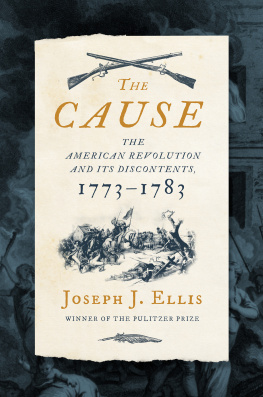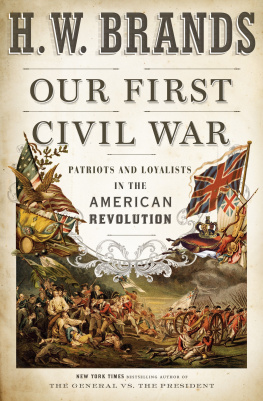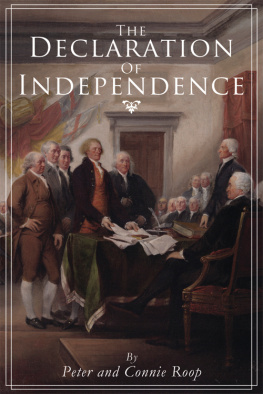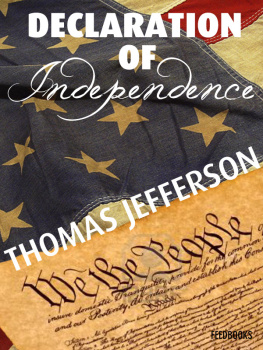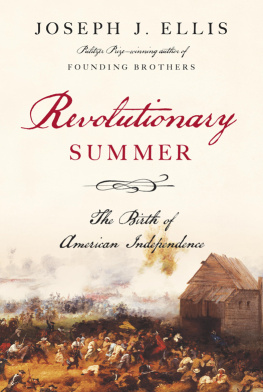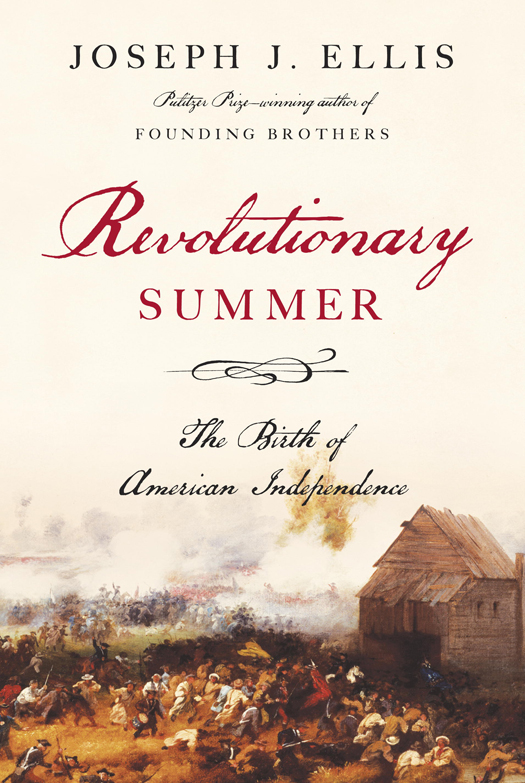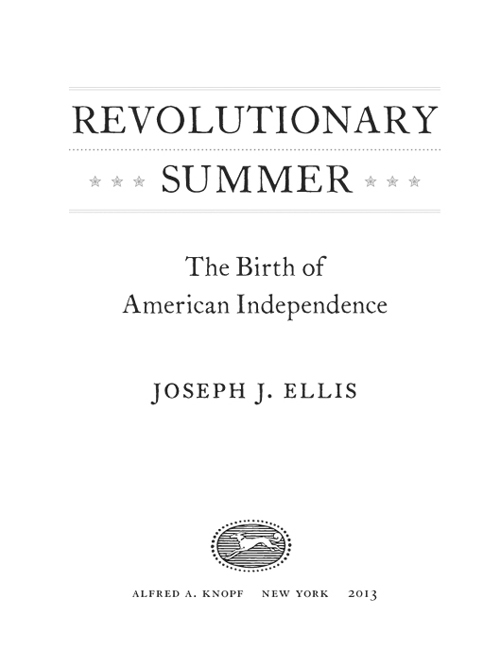THIS IS A BORZOI BOOK
PUBLISHED BY ALFRED A. KNOPF
Copyright 2013 by Joseph J. Ellis
All rights reserved. Published in the United States by Alfred A. Knopf, a division of Random House LLC, New York, a Penguin Random House Company, and in Canada by Random House of Canada Limited, Toronto.
www.aaknopf.com
Knopf, Borzoi Books, and the colophon are registered trademarks of Random House LLC.
Library of Congress Cataloging-in-Publication Data
Ellis, Joseph J.
Revolutionary summer : the birth of American independence / by Joseph J. Ellis.1st ed.
pages cm
Includes bibliographical references and index.
ISBN: 978-0-307-70122-0
eBook ISBN: 978-0-385-34962-8
1. United StatesHistoryRevolution, 17751783 I. Title.
E 208. E 48 2013
973.3dc23 2012026140
Maps by Jeffrey L. Ward
Front-of-jacket image: The Battle of Long Island by Alonzo Chappel.
Collection of the Brooklyn Historical Society
Spine-of-jacket image: Unite or Die:
The 13 colonies, Art Resource, NY
Cover design by Gabriele Wilson
v3.1_r1
In memory of
ASHBEL GREEN
CONTENTS
PREFACE
If you will grant a somewhat expansive definition of summer, then the summer of 1776 was the crescendo moment in American history. During the five months between May and October, a consensus for American independence emerged and was officially declared, the outlines for an American republic were first proposed, the problems that would shape its future were faced and finessed, and the largest armada ever to cross the Atlantic arrived to kill the American rebellion in the cradle, which it then very nearly did.
There are two intertwined strands to this story that are customarily told as stand-alone accounts in their own right. The first is the political tale of how thirteen colonies came together and agreed on the decision to secede from the British Empire. Here the center point is the Continental Congress, and the leading players, at least in my version, are John Adams, John Dickinson, Thomas Jefferson, and Benjamin Franklin.
The second is the military narrative of the battles on Long Island and Manhattan, where the British army and navy delivered a series of devastating defeats to an American army of amateurs, but missed whatever chance existed to end it all. The focal point of this story is the Continental Army, and the major actors are George Washington, Nathanael Greene, and the British brothers Richard and William Howe.
My contention in the pages that follow is that the political and military experiences were two sides of a single story, which are incomprehensible unless told together. They were both happening at the same time, events on one front influenced outcomes on the other, and what most modern scholarship treats separately was experienced by the participants as one.
More specifically, the political consensus that formed around American independence in June and July was driven by a widespread loathing of the looming British invasion at New York. And the commanders of both the British and the American armies made battlefield decisions on multiple occasions based on their perceived political impact on public opinion. The battles on Long Island and Manhattan were political contests for hearts and minds more than military maneuvers for territory.
Knowing the outcome of the American Revolution has also blinded us to the problematic character of this intense moment, when everything was in the balance, history was happening at an accelerating pace, and both sidesespecially the Americanswere improvising on the edge of catastrophe. The delegates in the Continental Congress and the officers in the Continental Army were forced to make highly consequential decisions without knowing what the consequences would be. In this compressed moment, they were living, as Adams put it, in the midst of a Revolution, which almost by definition meant that they were making it up as they went along.
Two articles of faith were also colliding. The first was that the British army and navy were invincible, which turned out to be true. The second was that the cause of American independence, often referred to in semi-sacred incantations as The Cause, was inevitable, which turned out to be truer. Recovering this supercharged moment as a historian necessarily entails seeing the choices as they were perceived by the participants at the time, on both the American and the British sides. But how we assess those choices is inescapably a function of our privileged perch in the twenty-first century.
For example, the Continental Congress made a deliberate decision to avoid any consideration of the slavery question, even though most delegates were fully aware that it violated the principles they claimed to be fighting for. Adams is most revealing on this score because, more
To take another example, our recent experiences in Southeast Asia and the Middle East have prepared us to understand the dilemmas confronting armies of occupation in a distant land, facing an indigenous enemy with a revolutionary agenda. The
If such a chance ever did exist, it occurred in the summer of 1776, when the Howe brothers missed several opportunities to destroy the Continental Army on Long Island and Manhattan. Chance, luck, and even the vagaries of the weather played crucial roles, as did the strategic and tactical decisions of the Howes, which came under considerable criticism after the war, when hindsight revealed that their more measured and limited goals were rooted in a fundamental misreading of the challenges they were facing. There was disagreement within the American camp at the time about the fate of the rebellion if the Continental Army ceased to exist. We can never know, because it did not happen, though it was a very close call. Hindsight does allow us to know that once the Howes missed the opportunity to destroy the Continental Army early in the war, it would never come again.
So this is the story of the birth of the American Revolution, the pains and tribulations that accompanied that process, and the large and small decisions in both the political and the military arenas that shaped the outcome. It is told as a story, which means that narrative is presumed to be the highest form of analysis, and recovering the way it looked to the participants must precede any imposition of our superior wisdom in the present.
Before we begin our trek back to the past, two oddly shaped features of the terrain merit mention, chiefly because they do not align themselves with the expectations we carry in our heads and therefore need to be marked on the map beforehand.
The first is a distinctive sense of honor, a lingering vestige of the medieval world that was still alive and pervasive, especially within the military culture of the eighteenth century. The core concept in this quasi-chivalric code was character, the notion that a clearly defined set of principles governed a gentlemans behavior at all times, most especially in highly stressful or life-threatening situations. Men driven by this aristocratic sense of honor would tend to behave in ways we consider strange, like standing at attention in the face of a salvo of gunfire rather than lying down or seeking cover. Generals would discuss strategic and tactical options on the battlefield in similarly peculiar ways, because they regarded retreat as dishonorable and harmful to their reputations. Washington is the most conspicuously honor-driven character in our story, and his conduct throughout the Battle of New York is inexplicable unless viewed from this eighteenth-century perspective.









